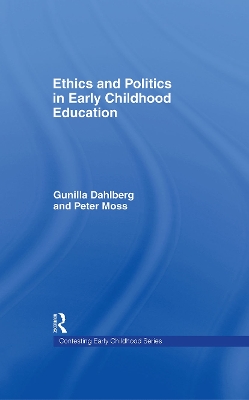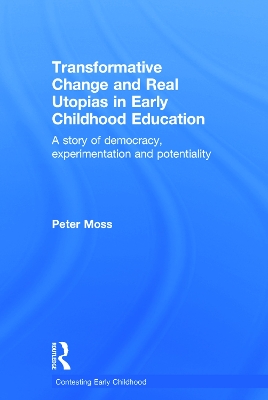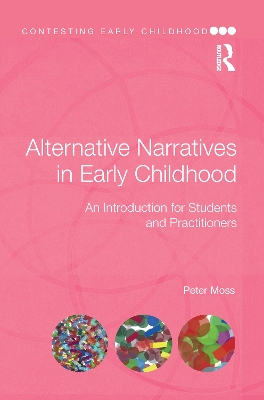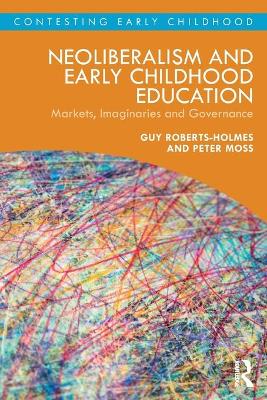Contesting Early Childhood
5 total works
Ethics and Politics in Early Childhood Education
by Gunilla Dahlberg and Peter Moss
The early childhood services of Reggio Emilia in Northern Italy has gained worldwide interest and admiration. Drawing on the ‘Reggio approach’, and others, this book explores the ethical and political dimensions of early childhood services and argues the importance of these dimensions at a time when they are often reduced to technical and managerial projects, without informed consideration for what is best for the child.
Extending and developing the ideas raised in Beyond Quality in Early Childhood Care and Education the successful team of authors make a wide range of complex material accessible to readers who may have little knowledge of the various important and relevant areas within philosophy, ethics, or politics, covering subjects such as:
- post-structural thinkers and their perspectives
- the history and practice of early childhood work in Reggio Emilia
- globalization, technological change, poverty, and environmental degradation
- ethical and political perspectives relevant to early childhood services from Foucault and Deleuze, to Beck, Bauman and Rose.
This book presents essential ideas, theories and debates to an international audience. Those who would find this particularly useful are practitioners, trainers, students, researchers, policymakers and anyone with an interest in early childhood education.
Transformative Change and Real Utopias in Early Childhood Education
by Peter Moss
Early childhood education and care is a major policy issue for national governments and international organisations. This book contests two stories, both infused by neoliberal thinking, that dominate early childhood policy making today - ‘the story of quality and high returns’ and ‘the story of markets’, stories that promise high returns on investment if only the right technologies are applied to children and the perfection of a system based on competition and individual choice.
But there are alternative stories and this book tells one: a ‘story of democracy, experimentation and potentiality’ in which early childhood centres are public spaces and public resources, places where democracy and experimentation are fundamental values, community workshops for realising the potentiality of citizens. This story calls for transformative change but offers a real utopia, both viable and achievable. The book discusses some of the conditions needed for the story’s enactment and shows what it means in practice in a chapter about project work contributed by a Swedish preschool teacher.
Critical but hopeful, this book is an important contribution to resisting the dictatorship of no alternative and renewing a democratic politics of early childhood education. It is essential reading for students and teachers, researchers and other academics, and for all other concerned citizens.
Challenging dominant discourses in the field of early childhood education, this book provides an accessible introduction to some of the alternative narratives and diverse perspectives that are increasingly to be heard in this field, as well as discussing the importance of paradigm, politics and ethics.
Peter Moss draws on material published in the groundbreaking Contesting Early Childhood series to introduce readers to thinking that questions the mainstream approach to early childhood education and to offer rich examples to illustrate how this thinking is being put to work in practice. Key topics addressed include:
- dominant discourses in today's early childhood education - and what is meant by 'dominant discourse'
- why politics and ethics are the starting points for early childhood education
- Reggio Emilia as an example of an alternative narrative
- the relevance to early childhood education of thinkers such as Michel Foucault and Gilles Deleuze and of theoretical positions such as posthumanism.
An enlightening read for students and practitioners, as well as policymakers, academics and parents, this book is intended for anyone who wants to think more about early childhood education and delve deeper into new perspectives and debates in this field.
v. 4
Contesting Early Childhood...and Opening for Change
by Gunilla Dahlberg and Peter Moss
Drawing on and concluding a landmark series, Contesting Early Childhood, this book offers a review of the emerging critique of the dominant discourse and, equally important, examines the possibilities for change that alternative discourses are opening up, both theoretically and in actual practice. Through argument and example this book:
- provides many examples of emerging new practice
- discusses the conditions needed to further this process of experimentation, diversification and renewal
- offers a democratic challenge to everyone interested in early childhood.
This valuable addition to the literature covers a wide variety of critical issues in Early Childhood education and is a must-read for students of Early Years Education.
Neoliberalism and Early Childhood Education
by Peter Moss and Guy Roberts-Holmes
Neoliberalism, with its worldview of competition, choice and calculation, its economisation of everything, and its will to govern has ‘sunk its roots deep’ into Early Childhood Education and Care. This book considers its deeply detrimental impacts upon young children, families, settings and the workforce. Through an exploration of possibilities for resistance and refusal, and reflection on the significance of the coronavirus pandemic, Roberts-Holmes and Moss provide hope that neoliberalism’s current hegemony can be successfully contested.
The book provides a critical introduction to neoliberalism and three closely related and influential concepts – Human Capital theory, Public Choice theory and New Public Management – as well as an overview of the impact of neoliberalism on compulsory education, in particular through the Global Education Reform Movement. With its main focus on Early Childhood Education and Care, this book argues that while neoliberalism is a very powerful force, it is ‘deeply problematic, eminently resistible and eventually replaceable’ – and that there are indeed alternatives.
Neoliberalism and Early Childhood Education is an insightful supplement to the studies of students and researchers in Early Childhood Education and Sociology of Education, and is also highly relevant to policy makers.




